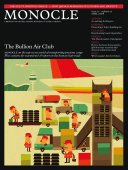
Issue 12
The Bullion Air Club: Monocle on the top-secret world of transporting precious cargo. Plus: anyone for extensions? A report on the human hair trade.
In This Issue
Oops! No content was found.
Looks like we no longer have content for the page you're on. Perhaps try a search?
Return Home

